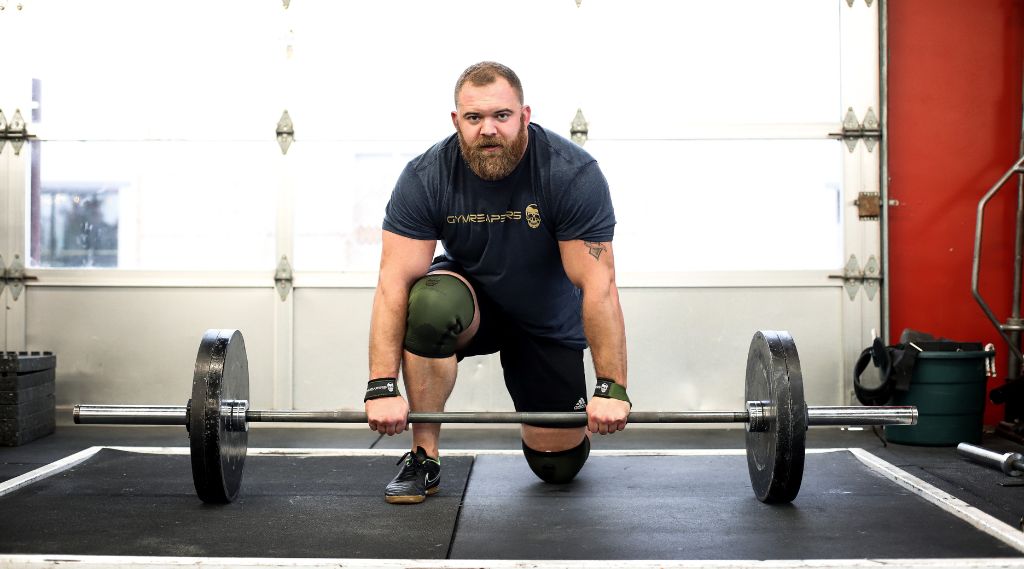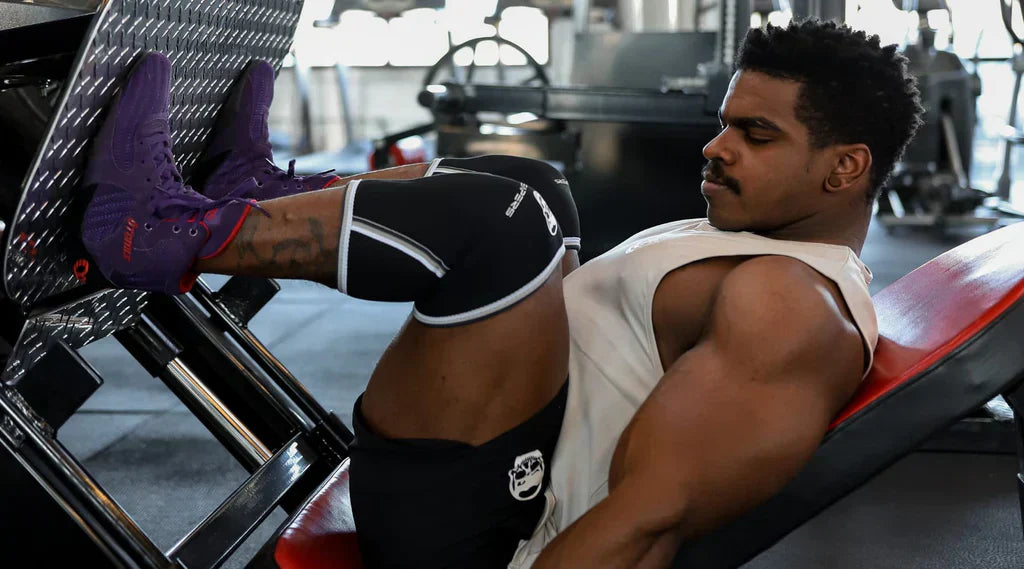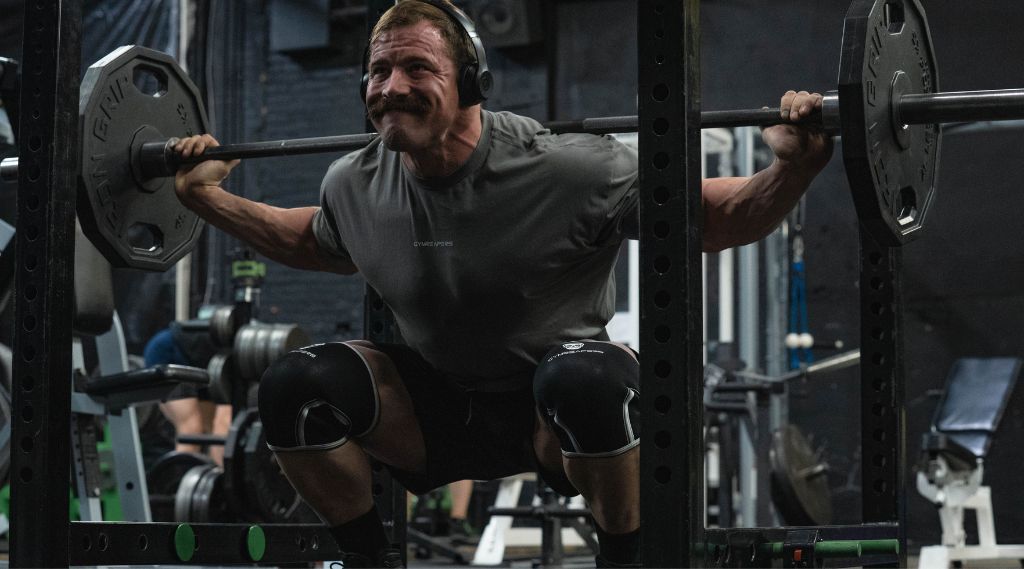We've all been there: you're at the gym, prepping for your deadlifts, and you wonder whether you should pull on some knee sleeves.
Maybe it’s because you saw someone else doing it, or maybe you have your own reasons, but It's a common question, and you're not alone.
Should you wear knee sleeves for deadlifts?
You should wear knee sleeves for deadlifts if you find that your technique, strength, and confidence improve while using them. However, it’s important to be strategic about how you incorporate them so you don’t become too dependent on them for stability and support.
Now that we've got the quick answer out of the way, let's dive deeper into the benefits, drawbacks, and use cases for knee sleeves so you can decide whether you should wear them or not while deadlifting.
Key Takeaways
5 Benefits Of Wearing Knee Sleeves For Deadlifts

To decide whether it’s worth it or not to wear knee sleeves for deadlifts, it’s important to understand the potential benefits:
1. Enhanced Joint Support
Knee sleeves provide additional support to the knee joint, which helps to stabilize the knee and reduce stress on the ligaments.
This can be particularly beneficial during deadlifts when the knee joint is at its most flexed position when the barbell is on the floor.
2. Increased Warmth and Blood Flow
Knee sleeves are designed to keep your knees warm, which helps to improve blood flow to the joint and surrounding musculature.
The warmth that knee sleeves provide can help lubricate your joints by dispersing the synovial fluid (fluid within the joint) which reduces friction and can alleviate minor aches and pains.
Better blood flow due to increased warmth also means more oxygen and nutrients are delivered to your muscles, potentially reducing soreness and speeding up recovery after an intense deadlifting session.
3. Injury Prevention
By providing support and warmth to your knees, knee sleeves may help to reduce the risk of injury.
The support they offer can help to keep the joint stable and in proper alignment during the lift, minimizing the chances of twisting or straining the knee.
The warmth that they offer can ensure that your knees are well-lubricated and prepared for the task ahead, which can be beneficial when you’re resting for longer periods between sets.
4. Boosted Confidence and Mental Focus
For some lifters, wearing knee sleeves can provide a mental boost by offering a sense of security and support.
Knowing that your knees are protected can help you focus more on your technique and lifting performance, rather than worrying about potential injuries.
For this reason, some lifters find that they can lift more weight while wearing knee sleeves than without them.
5. Improved Lifting Technique
While knee sleeves won't magically fix your technique, they can encourage better movement patterns by providing proprioceptive feedback. This means that they help you become more aware of your knee positioning and movement throughout the lift, potentially leading to improved form over time.
This proprioceptive feedback could work for:
- Those who tend to let their knees cave in
- Those who forget to drive through their legs off the floor
- Those who are prone to locking out their knees too early
Related Article:
4 Drawbacks Of Wearing Knee Sleeves For Deadlifts

Although there are benefits to wearing knee sleeves for deadlifts, there are also some potential drawbacks to consider:
1. Potential For Overreliance
Some lifters may become overly dependent on knee sleeves for support, which can hinder the development of their natural joint stability and strength. It's important to strike a balance between using knee sleeves for support and allowing your body’s stabilizing muscles to do their job.
You should never get to the point where you feel you cannot deadlift without sleeves, especially when lifting lighter weights.
2. Discomfort or Restriction
Depending on the fit and material, knee sleeves can sometimes cause discomfort or restrict your range of motion during deadlifts. Too tight of a fit may cause pinching or digging into the skin, while too loose of a fit may result in the sleeves sliding down or bunching up during the lift.
Additionally, some lifters also find that knee sleeves mess up their bar path because the bar is getting caught on the sleeve as they are dragging the bar up their shin.
3. Cost and Maintenance
High-quality knee sleeves can be pricey, especially for those on a budget, so it may not be worth the investment if you don’t notice a difference in performance when using them.
Additionally, they require regular maintenance, such as washing and air-drying, to prevent odor buildup and maintain their elasticity. Some lifters may find that the expense and upkeep aren't worth the potential benefits.
4. Limited Direct Performance Impact
While knee sleeves can offer several indirect benefits, such as joint support and injury prevention, they don't directly increase your deadlifting performance.
For this reason, there is no guarantee that you will notice a difference in your deadlifting capabilities when wearing knee sleeves.
If you're looking to improve your lifting numbers, focusing on your technique and training program will yield more significant results than simply wearing knee sleeves.
Should You Wear Knee Sleeves For Deadlifts: My Recommendation
Ultimately, whether or not you should wear knee sleeves for deadlifts comes down to your personal preference and training goals. If you find value in the support, warmth, and injury prevention that they offer, then it's worth wearing knee sleeves while deadlifting.
However, if you don't feel any significant benefits or find them uncomfortable, you may want to skip them and focus on other aspects of your training.
Personally, I don’t wear knee sleeves while I deadlift, as I don’t experience any discomfort or feel the need for added support. When I started powerlifting many years ago, I did test them out, but mostly because I already owned a pair and I thought they looked cool.
Use Cases for Wearing Knee Sleeves
To help you decide whether you should use knee sleeves for deadlifts, I’ll highlight the use cases that I think would warrant their use.
Knee sleeves for deadlifts can be beneficial:
- during heavy sets or max effort lifts
- while recovering from a knee injury
- if you’re experiencing knee pain that is alleviated with the use of knee sleeves
Balancing Training With & Without Knee Sleeves
To avoid becoming overly reliant on knee sleeves, it's a good idea to balance your training sessions by using them selectively rather than for every single deadlift.
Consider wearing them only for your heaviest sets of barbell deadlifts, while skipping them for warm-ups, variations (i.e. RDLs or block pulls), and back-off sets.
This approach can help you maintain the benefits of knee sleeves while still allowing your body to develop natural joint stability and strength.
Best Type of Knee Sleeve for Deadlifts

When choosing the best knee sleeves for deadlifts it's important to consider factors such as material, length, and thickness. Each of these aspects can affect the overall performance and comfort of the knee sleeve during your training sessions.
Material
Knee sleeves are typically made from neoprene, which offers excellent support, durability, and elasticity. Neoprene sleeves also help retain warmth, which can improve blood flow and reduce the risk of injury.
When selecting knee sleeves, look for a high-quality neoprene material to ensure proper support and longevity.
Length
The length of knee sleeves can vary, but most designs cover the entire knee joint and extend slightly above and below it. This coverage provides optimal support and stability during deadlifts.
Make sure to choose a sleeve that offers enough length to cover and protect your knee without causing discomfort or restricting your range of motion.
Thickness
Knee sleeves come in various thicknesses, typically ranging from 3mm to 7mm. Thicker sleeves offer more support and warmth, while thinner sleeves provide greater flexibility and breathability.
Look for 7mm knee sleeves for maximum support and stability for your deadlift sessions.
My Recommendation: GymReaper Knee Sleeves

For those who are set on wearing knee sleeves for deadlifts, I recommend GymReaper's 7mm knee sleeves because these high-quality neoprene sleeves offer excellent support, durability, and warmth.
These knee sleeves are ideal for powerlifters looking to protect their knee joints and enhance their lifting experience. By choosing GymReaper's knee sleeves, you'll be investing in a reliable and effective product that can help you reach your deadlifting goals while reducing the risk of injury.
Examples of Powerlifters Wearing Knee Sleeves For Deadlifts
RJ Butcher
RJ Butcher, always known as stronglikerj on Instagram, is one of many powerlifters who uses knee sleeves while deadlifting.
Check out his recent personal record deadlift of 905lbs wearing knee sleeves:
Frequently Asked Questions
Will Knee Sleeves Help You Deadlift More?
Knee sleeves don't directly increase your deadlifting performance, but they can provide joint support, warmth, and injury prevention, which may indirectly contribute to improved lifting technique and confidence.
Are Knee Sleeves Allowed In The Deadlift During Powerlifting?
Yes, knee sleeves are generally allowed during powerlifting competitions, but I recommend you check the specific rules of your federation to ensure compliance with their equipment regulations, just to be safe.
Are Wraps or Sleeves Better For Deadlifts?
Knee sleeves are better for deadlifts than wraps because they provide support and warmth without restricting movement. Wraps are generally more suited for squats, where maximal joint support is required.
Are Thinner Knee Sleeves Better For Deadlifts?
Thinner knee sleeves offer greater flexibility and breathability, while thicker sleeves provide more support and warmth. The right level of thickness will depend on your personal preference and requirements.
How Tight Should Knee Sleeves Be For Deadlifts?
Knee sleeves should be snug but not overly tight. They should offer support without causing discomfort, pinching, or restricting your range of motion. Measure your knee circumference to choose the right size.
How Do I Clean and Maintain My Knee Sleeves?
Wash knee sleeves with mild soap and water or a gentle detergent. Air-dry them away from direct sunlight to maintain elasticity. Avoid using bleach or fabric softeners, as these can damage the material.
Can I Use Knee Sleeves for Other Exercises?
Yes, knee sleeves can be used for various exercises, such as squats and lunges, where knee joint support and stability are beneficial. They can be a versatile addition to your training gear.
When Should I Replace My Knee Sleeves?
Replace your knee sleeves when they show signs of wear, such as loss of elasticity, tears, or fraying. Regular maintenance and proper care can help extend their lifespan, but eventually, they'll need to be replaced for optimal support.













Leave a comment
All comments are moderated before being published.
This site is protected by hCaptcha and the hCaptcha Privacy Policy and Terms of Service apply.